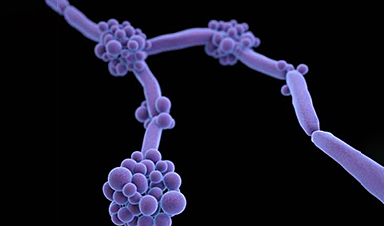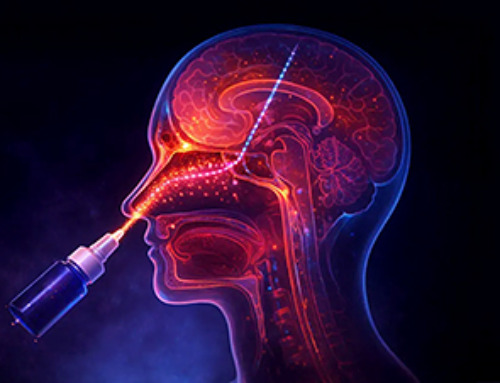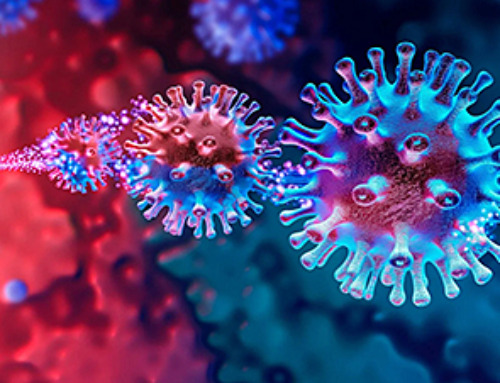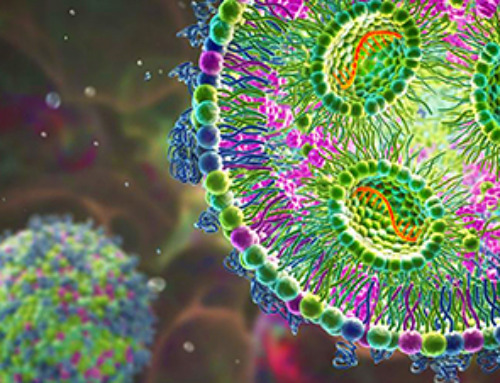The Candida auris fungus is spreading across the globe at an “alarming” speed. This species of fungus, which can cause fatal infections in risk groups and was first discovered only 10 years ago, can now be found all over the world. In nearly all cases, infections are contracted in hospitals, and the fungus has become resistant to all current drugs. Molecular biologist Auke de Jong, who is conducting research to try to understand the fungus, will be defending his Ph.D. thesis on 22 December in the Agnietenkapel in Amsterdam.
“We are seeing a shift away from infections caused by Candida species that are easily treatable towards drug-resistant species that pose a threat, with Candida auris being one of the most notorious of these infectious fungi species.”
The origins of the fungus as still shrouded in mystery. De Jong is looking for clues in the DNA and behavior of Candida auris. “We suspect that seawater plays a key role,” he says. “Because this fungus has a very high tolerance for salt, which is a substance many fungi cannot cope with. The sea could be a plausible route for the global spread of Candida auris; it may have been spread across the globe by the currents.”
According to De Jong, its spread is alarming. “The fungus causes an exceptionally high death rate among risk groups and cannot be properly treated. It’s a robust and highly adaptable fungus. For example, in addition to its high tolerance for salt, it can also easily survive relatively high temperatures and commonly used disinfectants.”
Nearly all infections with the fungus are contracted in hospitals. “Operations present an opportunity for the fungus to enter the body.” It is unknown where the patients first came in contact with the fungus. “Hospitals are unlikely to be the original source; patients probably already carried the fungus with them for some time.”
However, there are explanations for its fast spread. “It is mainly due to the huge medical advances made in recent decades. There is now a whole group of people who continue to live with diseases from which people used to die more quickly. The downside of that is that this group often has a severely weakened immune system, which makes them much more vulnerable to infections.”
According to De Jong, there is therefore an urgent need to work on being able to detect and fight the fungus early on. “My research is mapping the unique characteristics of this Candida species. We are currently seeing many misdiagnoses in hospitals, leading to incorrect or belated treatment of fungal infections. To be able to reduce that, we first need to identify and understand the fungus better.”
Actions of mankind have accelerated the fungus’ adaptive capacity
The fact that species of fungi are adapting to the substances with which we fight them is not exactly a new development. “It is similar to the capacity of all living organisms to slowly adapt to their changing environment. But what is new is that, through our actions, such as the large-scale use of fungicides in agriculture, we (mankind) have accelerated the process in this fungus. In this way, we are contributing to the development of a fungus that is even more quickly building an increasingly stronger resistance to the substances with which we fight it.”
Auke de Jong will defend the dissertation “Fungal Pathogens Exposed. Novel insights into Candida auris and emerging relatives of the Candida haemulonii species complex” on 22 December in the Agnietenkapel in Amsterdam.
Provided by University of Amsterdam
News
Miller School Researchers Pioneer Nanovanilloid-Based Brain Cooling for Traumatic Injury
A multidisciplinary team at the University of Miami Miller School of Medicine has developed a breakthrough nanodrug platform that may prove beneficial for rapid, targeted therapeutic hypothermia after traumatic brain injury (TBI). Their work, published in ACS [...]
COVID-19 still claims more than 100,000 US lives each year
Centers for Disease Control and Prevention researchers report national estimates of 43.6 million COVID-19-associated illnesses and 101,300 deaths in the US during October 2022 to September 2023, plus 33.0 million illnesses and 100,800 deaths [...]
Nanomedicine in 2026: Experts Predict the Year Ahead
Progress in nanomedicine is almost as fast as the science is small. Over the last year, we've seen an abundance of headlines covering medical R&D at the nanoscale: polymer-coated nanoparticles targeting ovarian cancer, Albumin recruiting nanoparticles for [...]
Lipid nanoparticles could unlock access for millions of autoimmune patients
Capstan Therapeutics scientists demonstrate that lipid nanoparticles can engineer CAR T cells within the body without laboratory cell manufacturing and ex vivo expansion. The method using targeted lipid nanoparticles (tLNPs) is designed to deliver [...]
The Brain’s Strange Way of Computing Could Explain Consciousness
Consciousness may emerge not from code, but from the way living brains physically compute. Discussions about consciousness often stall between two deeply rooted viewpoints. One is computational functionalism, which holds that cognition can be [...]
First breathing ‘lung-on-chip’ developed using genetically identical cells
Researchers at the Francis Crick Institute and AlveoliX have developed the first human lung-on-chip model using stem cells taken from only one person. These chips simulate breathing motions and lung disease in an individual, [...]
Cell Membranes May Act Like Tiny Power Generators
Living cells may generate electricity through the natural motion of their membranes. These fast electrical signals could play a role in how cells communicate and sense their surroundings. Scientists have proposed a new theoretical [...]
This Viral RNA Structure Could Lead to a Universal Antiviral Drug
Researchers identify a shared RNA-protein interaction that could lead to broad-spectrum antiviral treatments for enteroviruses. A new study from the University of Maryland, Baltimore County (UMBC), published in Nature Communications, explains how enteroviruses begin reproducing [...]
New study suggests a way to rejuvenate the immune system
Stimulating the liver to produce some of the signals of the thymus can reverse age-related declines in T-cell populations and enhance response to vaccination. As people age, their immune system function declines. T cell [...]
Nerve Damage Can Disrupt Immunity Across the Entire Body
A single nerve injury can quietly reshape the immune system across the entire body. Preclinical research from McGill University suggests that nerve injuries may lead to long-lasting changes in the immune system, and these [...]
Fake Science Is Growing Faster Than Legitimate Research, New Study Warns
New research reveals organized networks linking paper mills, intermediaries, and compromised academic journals Organized scientific fraud is becoming increasingly common, ranging from fabricated research to the buying and selling of authorship and citations, according [...]
Scientists Unlock a New Way to Hear the Brain’s Hidden Language
Scientists can finally hear the brain’s quietest messages—unlocking the hidden code behind how neurons think, decide, and remember. Scientists have created a new protein that can capture the incoming chemical signals received by brain [...]
Does being infected or vaccinated first influence COVID-19 immunity?
A new study analyzing the immune response to COVID-19 in a Catalan cohort of health workers sheds light on an important question: does it matter whether a person was first infected or first vaccinated? [...]
We May Never Know if AI Is Conscious, Says Cambridge Philosopher
As claims about conscious AI grow louder, a Cambridge philosopher argues that we lack the evidence to know whether machines can truly be conscious, let alone morally significant. A philosopher at the University of [...]
AI Helped Scientists Stop a Virus With One Tiny Change
Using AI, researchers identified one tiny molecular interaction that viruses need to infect cells. Disrupting it stopped the virus before infection could begin. Washington State University scientists have uncovered a method to interfere with a key [...]
Deadly Hospital Fungus May Finally Have a Weakness
A deadly, drug-resistant hospital fungus may finally have a weakness—and scientists think they’ve found it. Researchers have identified a genetic process that could open the door to new treatments for a dangerous fungal infection [...]





















